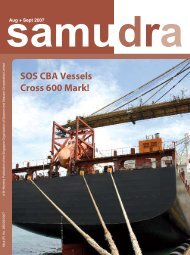samudra
samudra - Singapore Organisation of Seamen
samudra - Singapore Organisation of Seamen
- No tags were found...
You also want an ePaper? Increase the reach of your titles
YUMPU automatically turns print PDFs into web optimized ePapers that Google loves.
Doing Our Part:<br />
Be a Responsible<br />
Maritime Sea-tizen<br />
“Terrorism is a global threat with global effects...its<br />
consequences affect evey aspect of the United Nations<br />
agenda from development to peace to human rights and the<br />
rule of law. By its very nature, terrorism is an assault on the<br />
fundamental principles of law, order, human rights, and the<br />
peaceful settlement of disputes upon which the United Nations<br />
(UN) is established. The UN has an indispensable role to play in<br />
providing the legal and organisational framework within which<br />
the international campaign against terrorism can unfold.”<br />
- Kofi Annan, UN Secretary General<br />
7 October 1985<br />
Achille Lauro, an Italian passenger ship seized by four Palestinians<br />
12 October 2000<br />
Suicide bombing attack on U.S. Destroyer, USS Cole in Aden Harbour, Yemen<br />
11 October 2002<br />
Attack on MV Lumburg; “Invade Iraq and We’ll Sink Your Tanker Fleet!”<br />
26 February 2004<br />
Explosion onboard Super Ferry 14 shortly after leaving Manila Harbour with<br />
899 passengers and crew<br />
28 August 2005<br />
Ferry bombing to sow terror in Philippines<br />
The parallel relationship shared by these incidences is a strong indication of a<br />
threat that is very real in today’s world – terrorism.<br />
With trans-national terrorism infiltrating every nook and cranny, the maritime<br />
industry is not spared either. The shipping community may be faced with threats<br />
of terrorism looming at sea and at port facilities as they interface with ships from<br />
all over the world. The main concern is that ships in port will be used to export<br />
terrorism. To prevent the propagation of terrorism via ships and port facilities,<br />
the International Ship and Port Facility Security (ISPS) Code was created and<br />
enforced in 1 July 2004 to ward off possible threats posed by such terrorists.<br />
Chapter V and XI-2 of the International Convention for Safety of Life at Sea (SOLAS)<br />
1974 were amended and the ISPS Code (Part A and B) was implemented at the<br />
same time. These provisions are applicable to ships engaged on international<br />
voyages and Port Facilities that serve such ships.<br />
In view of the adoption of these requirements to enhance maritime safety by the<br />
International Maritime Organisation (IMO), SOS held a seminar on ISPS code to<br />
raise the understanding of its members on the SOLAS Amendments and ISPS<br />
What Our Members Say:<br />
“ “<br />
Initially, I wasn’t really sure what<br />
this new ISPS code or SOLAS<br />
amendments were about. I thought<br />
that I could just wait and depend<br />
on the Master to give instructions.<br />
But now I know that I can do<br />
more to help; such as looking out<br />
for anomalies or how security of<br />
the vessel and seafarers can be<br />
enhanced. Be it piracy or terrorism,<br />
we must never take things lightly.<br />
“<br />
Mohd Sani Mawi, NOL container ship,<br />
active seaman of 18 years<br />
“<br />
Back when SOS informed us about<br />
the ISPS code and the SOLAS<br />
amendments, I had wondered what<br />
the “fuss” was all about. I’m glad<br />
I came for this seminar because a<br />
lot of my doubts are cleared, and I<br />
have a better understanding of the<br />
need for these implementations.<br />
More importantly, knowing what the<br />
procedures are and how to carry<br />
them out correctly can really make a<br />
difference.<br />
“<br />
Hussain Ahmad, NOL bulk carrier, active<br />
seaman of 10 years<br />
code, as well as the basic security<br />
measures implemented by ships.<br />
Maritime Security Initiatives employed<br />
by MPA were also highlighted.<br />
The half-day seminar on 24 March<br />
2006 was conducted by Mr Alex<br />
Heng, Manager of Maritime Security<br />
of ST Education & Training Pte Ltd.<br />
Held at the Multi-Purpose Hall of the<br />
Seacare Building, the presentation<br />
included video clips, role-play and<br />
discussions with the 37 attendees.<br />
Said Mr Heng: “The implementation<br />
of the ISPS Code provides for the<br />
adoption of security measures after<br />
considering the risks and vulnerability<br />
of the potential threats that affects<br />
ships and port facilities. It is important<br />
and necessary that seafarers become<br />
aware of such security arrangements.<br />
The Ship Security Officer and crew<br />
must know the Security Plan to do<br />
their part in enhancing maritime safety<br />
and security.”<br />
Everyone should take responsibility<br />
and stay updated about such<br />
amendments or implementations at all<br />
times. We take orders from the Master,<br />
but with a better understanding, we<br />
are better able to comprehend his<br />
decisions and thus, be more efficient<br />
and effective in carrying out his<br />
instructions.<br />
“<br />
Thomas Tan, SSC car carrier, active<br />
seaman of 20 years<br />
febplusmar2006 <strong>samudra</strong><br />
11
















